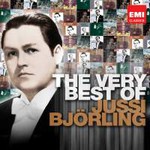
Jussi Bjorling - The Very Best Of
 $25.00
Special Order
$25.00
Special Order3 - 6 weeks add to cart
PUCCINI / PONCHIELLI / DONIZETTI / VERDI / LEONCAVALLO / MEYERBEER / etc
Jussi Bjorling - The Very Best Of
Jussi Bjorling (tenor) with various orchestras & conductors
[ EMI Very Best of Singers / 2 CD ]
Release Date: Tuesday 1 April 2003
This item is only available to us via Special Order. We should be able to get it to you in 3 - 6 weeks from when you order it.
Björling, like Gigli and Caruso before him, was idolised in his time as the operatic tenor par excellence in the Italian repertoire. He was a superb artist, with a voice of lyric sweetness that could also ring out heroically when needed. Johan 'Jussi' Jonaton Björling was born in Stora Tuna, Sweden, on 5 February 1911. From 1928 Björling studied singing at the Stockholm Conservatory, and on 20 August 1930 he made his operatic debut in a leading role as Don Ottavio in Don Giovanni at the Royal Swedish Opera, Stockholm. He quickly established his career and his international reputation was enhanced through the recordings he made for EMI, initially for the local Swedish branch (sung in Swedish) and later for the international market.
He first sang at La Scala, Milan, in 1946 in Rigoletto, and returned five years later for Un ballo in maschera. But it was at the Met in New York that he had his greatest successes from 1938 to the time of his death. Björling's Covent Garden debut took place on 12 May 1939 (Manrico in // trovatore), but he did not return there until March 1960, when, despite suffering from heart trouble, he triumphed as Rodolfo in La bohème. His health continued to deteriorate, and he sang for the last time at a concert in Stockholm on 20 August 1960. Following a severe heart attack, he died on 9 September 1960.
Although Björling was not much of an actor on stage, he nevertheless created convincing ` characters through the medium of his voice, over which he had absolute control. Nor was he adept at languages, which partly explains why he failed to receive the recognition he deserved in Italy. But as a tenor he was supreme: the rare ability to add dramatic power to his lyrical voice at will enabled him to sing almost any tenor role in the French and Italian repertoire, in much the same way as Caruso had done before him. This programme includes examples of Björling in his most famous operatic roles and also includes a number of popular songs and operetta arias, all of which were best-sellers when they were first released in the days of 78s and have remained firm favourites ever since.
Tracks:
Disc 1:
Questa o quella (Rigoletto)
La dona e mobile (Rigoletto)
Ah si, ben mio (Il travatore)
Di quella pira (Il trovatore)
Di tu se fedel (Un ballo in maschera)
Celeste Aida (Aida)
Ingemisco (Requiem)
Cujus animam (Stabat mater)
Una furtiva lagrima (L'elisir d'armore)
Cielo e mar (La Gioconda)
Come un bel di di maggio (Andrea Chenier)
Amore ti vieta (Fedora)
E la solita storia (Larlesian)
Donna non vidi mai (Manon Lecaut)
Che gelida mania (La boheme)
O Mimi, tu piu non torni (La boheme)
Recondia armonia (Tosca)
E lucevan le stelle (Tosca)
Nessun dorma (Turandot)
Mamma! quel vino e generoso (Cavalleria rusticana)
Vesti la giubba (Pagliacci)
No, Pagliaccio non son (Pagliacci)
Disc 2:
O paradiso (L'Africaine)
Salut! demeure chaste et pure (Faust)
Ange adorable (Romeo et Juliette)
Ah! leve-toi, soleil (Romeo et Juliette)
En ferment les yeux (Manon)
Ah, fuyez, douce image (Monon)
La fleur que tu m'avaisjetee (Carmen)
Je crois entendre encore (The Pearl Fishers)
Adelaide
Morgen!
Cacilie
In the Silence of Night
Lilacs
Ideale
O sole mio
Mattata
Because
Only a Rose (The Vagabond King)
For You Alone
Au mont Ida trois deesses (La Belle Helene)
Ich hab'kein Geld (Der Bettelstudent)
Cantique de Noel
